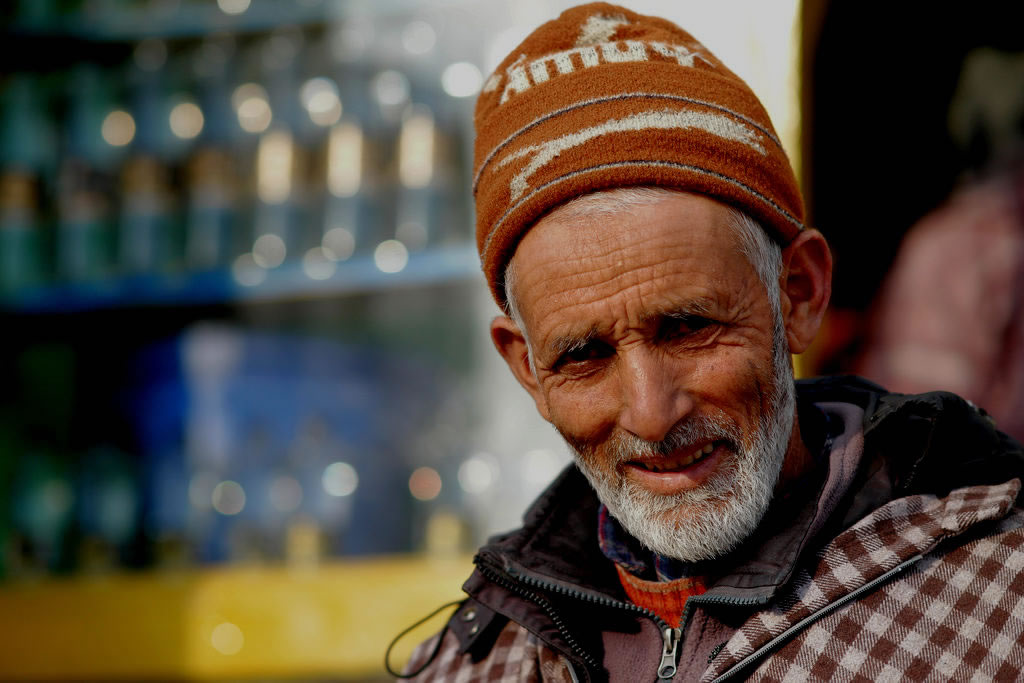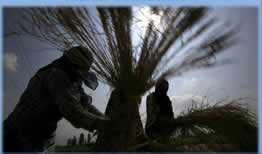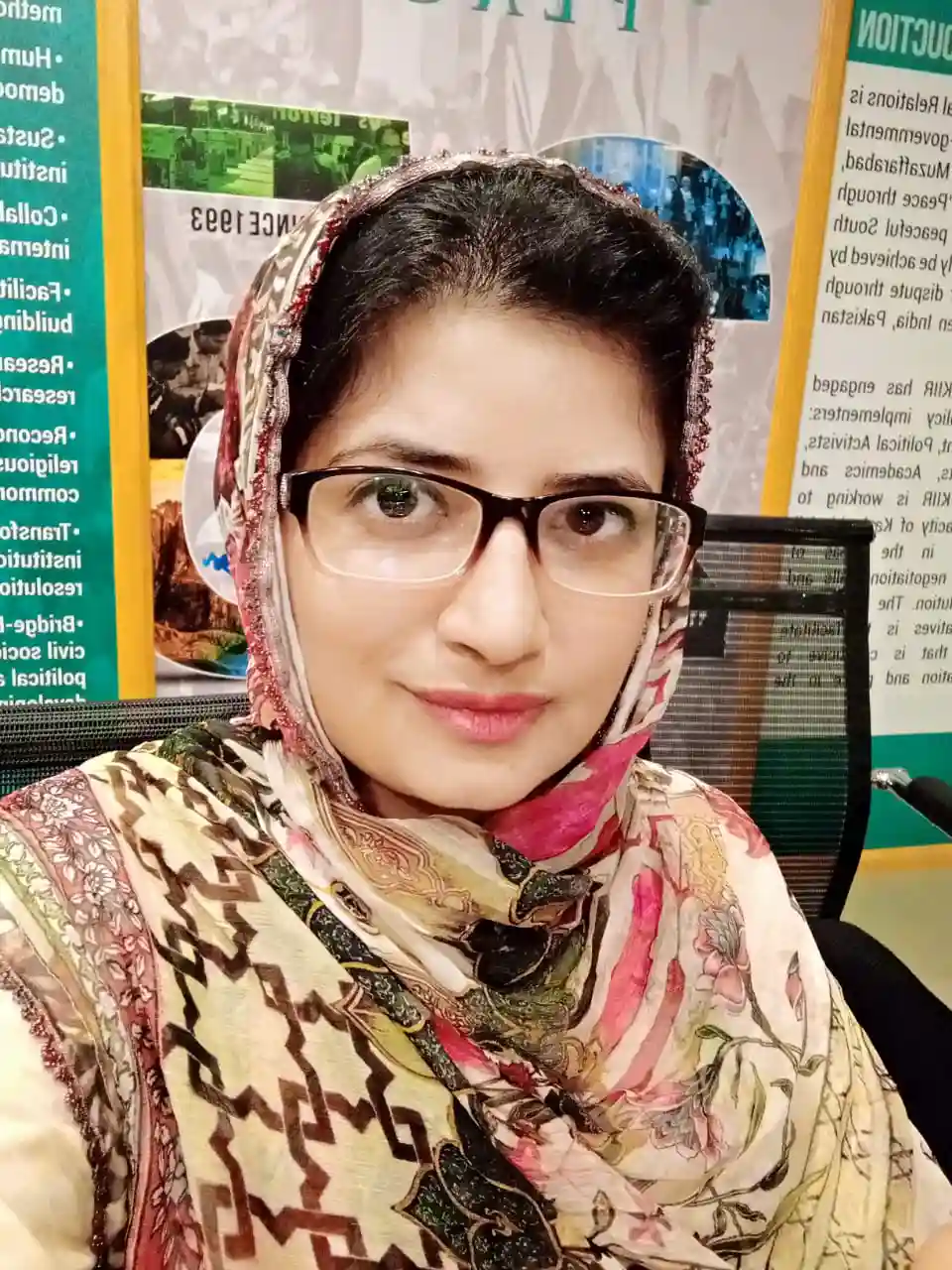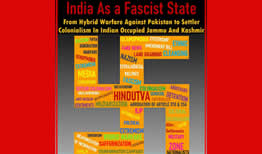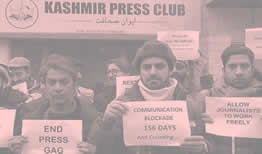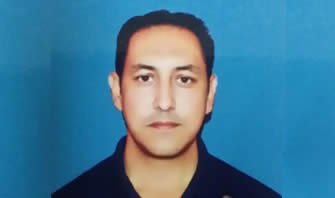The Impact of Conflict on Children’s Mental Health in Jammu and Kashmir
The Impact of Conflict on Children’s Mental Health in Jammu and Kashmir
ABSTRACT
This research paper examines the psychological impact of ongoing conflict on children in Jammu and Kashmir, a region plagued by decades of political instability, violence, and insecurity. Children in this area are particularly vulnerable to psychological distress, which manifests in conditions such as anxiety, depression, post-traumatic stress disorder (PTSD), and other trauma-related issues. The study highlights how the constant threat of violence, restrictions, and military presence disrupts children’s daily lives, leading to severe consequences for their emotional, cognitive, and social development. School closures, protests, and the lack of intellectual and social opportunities further hinder children’s growth and development.
By Yusra Shakeel
The research emphasizes the
need for integrating mental health support, educational reforms, and community
initiatives to provide children with the necessary resources to cope with the
trauma of living in a conflict zone. By focusing on children’s mental health
and well-being, the paper argues that fostering a supportive environment can
help break the cycle of violence and contribute to long-term regional stability.
Additionally, the research explores the unique socio-political and cultural
context of Jammu and Kashmir, which distinguishes it from other conflict zones,
and offers insights into how the prolonged exposure to violence affects
children's future prospects. This paper underscores the importance of
addressing the psychological needs of children in conflict regions to ensure
they have a healthy, productive future, which in turn can contribute to the
peace and security of the broader community.
Keywords: Psychological impact, Jammu and Kashmir, Children,
mental health, Trauma and development
Introduction
About information Jammu and Kashmir has been plagued by decades of
political instability, conflict and violence, which has distressed and often
affected the residents of the region, especially the children. Children are
particularly vulnerable to the psychological effects of conflict and experience
psychological problems that can have long-term effects on their emotional,
social and cognitive development. This research paper examines the
psychological impact of conflict on children in Jammu and Kashmir, focusing on
the ongoing violence, security and its impact on daily life, which can lead to
psychological problems such as anxiety, depression, posttraumatic stress
disorder (PTSD) and other trauma pains. Research shows a major impact on
children’s lives, especially in social and academic areas.
The closure of schools due to restrictions, protests and violence limits children’s opportunities for intellectual development, depriving them of important social skills for the development of imagination. Furthermore, the presence of military force and the constant threat of violence increase the fear of fear, which increases the stress on children. The disruption of fundamental elements of child development is compounding the stress that children already experience due to the lack of stability in their environment. She advocates for the integration of mental health care, education reform and community service.
Only through a collaborative approach can children in
conflict zones such as Jammu and Kashmir receive the support they need to heal,
recover and have a healthy, productive future. By investing in the health and
education of children in conflict zones, we contribute not only to their health
but also to the cause of peace and security in these regions. This research
paves the way for further research on how to support the mental health of
children affected by conflict and how to build communities that are resilient
to the trauma of violence and war. The northern part of the Indian subcontinent
has been a source of conflict for decades. Political conflicts, ethnic and
religious conflicts, and territorial disputes between India, Pakistan, and
China have led to violent clashes and conflicts among the population,
especially children. Persistent conflict has had a major impact not only on the
physical development of the land, but also on the mental and emotional
wellbeing of its people.
The most vulnerable group are children who have been traumatized by
violence, loss, and insecurity since childhood. Cognitive development in
conflict zones differs from that of children in stable environments. Daily life
for children in Jammu and Kashmir is characterized by prolonged restrictions,
armed forces, fear of violence, and uncertainty about the future. These
conditions have a significant impact on the health and development of
individuals and lead to many psychological disorders such as post-traumatic
stress disorder (PTSD), depression, anxiety stress and other injuries.
Furthermore, the sociocultural environment of the region is already poor due to
the continuous violence and its psychological impact on the youth continues to
cause more stress and affect the future of the entire society.Psychological
research on conflicts among children The number of children is increasing
worldwide, but children, especially in Kashmir, have different understandings
of this situation. While some studies have examined the impact of violence
against children in other conflict zones, the unique cultural, political and
historical context of Kashmir necessitates a centralized analysis of the issue.
This article aims to fill this gap by examining the impact of prolonged
conflict on the mental health of children in Jammu and Kashmir and how these
impacts manifest in their lives. Children live in conflict zones because they
continue to develop physically, emotionally and intellectually. Injuries during
this critical period of development can have longterm effects that affect not
only their current health but also their potential to develop into adults with
strong emotions and values. These effects are often not just immediate, but
continue to affect children as they grow up, affecting their relationships,
education, and ability to contribute to society. Understanding the
psychological impact of conflict on children in Jammu and Kashmir is therefore
important not only to meet their current needs but also to promote long-term
peace in the region. Over time, the state became one of the most militarized zones in the
world, with both India and Pakistan establishing military posts along the Line
of Control, the de facto border between the two countries. For families living
in Kashmir, this history is more than just a backgroundbut a constant reality.
Children in this area grow up in a militarized environment, where soldiers,
checkpoints, and lockdowns are a part of everyday life. As a result, the
conflict has woven itself into the fabric of society, affecting every aspect of
life, including education, economy, and social relations. Many children in
Kashmir, even those very young, have experienced or witnessed violence. This
exposure can have longterm mental health consequences, contributing to
psychological trauma that is difficult to address without adequate support.
This research posits
that children in Jammu and Kashmir endure considerable psychological distress
as a result of the ongoing conflict. The distress affects their social and
educational growth, resulting in difficulties with emotional stability and
future opportunities. Due to the absence of mental health assistance, it is
also suggested that families in Kashmir use informal coping strategies that
provide some relief but are inadequate to completely meet the mental health
requirements of these children.
To grasp the mental
health issues encountered by children in conflict areas such as Jammu and
Kashmir, one must begin with the concept of trauma theory. Trauma theory
elucidates how extended exposure to traumatic experiences influences
individuals over time, frequently resulting in enduring psychological and
emotional effects. Trauma is typically perceived as a strong emotional reaction
to an occurrence that interrupts an individual's feeling of security or safety.
For kids in conflict areas, where stability or control over their surroundings
is minimal, trauma frequently becomes a daily occurrence. Trauma theory offers
understanding into why children raised in these conditions face psychological
challenges like anxiety, depression, and post-traumatic stress disorder (PTSD).
The notion of "complex trauma" is particularly pertinent in this
context. In contrast to a solitary traumatic incident, complex trauma involves
ongoing exposure to traumatic experiences over an extended duration. In
Kashmir, children frequently face daily conflict-related stressors, including
witnessing violence and hearing about relatives being harmed or detained. This
continual exposure generates a distinct psychological weight that differs from
the impact of singular traumatic incidents.
When using trauma
theory, we also take into account how children handle and deal with trauma in a
different way than adults do. Developmentally, children are in the process of
shaping their understanding of the world, and when conflict disrupts this
process, it can warp their view of safety, relationships, and even their
personal identity. Trauma theory emphasizes the importance of social support as
a protective factor. When children do not have access to supportive networks,
such as schools and stable family settings, the effects of trauma often intensify.
In areas such as Kashmir, coping strategies frequently rely on informal support
systems—family, friends, and community members—due to the lack of formal mental
health services. Trauma theory highlights the significance of fostering
resilience; however, resilience may be challenging to cultivate without
external support systems. This theoretical perspective highlights the necessity
for organized support initiatives customized for children in conflict areas,
aimed at fulfilling their urgent mental health requirements while also aiding
them in developing lasting coping abilities.
Problem Statement
The conflict in Jammu and Kashmir has been ongoing for decades, and this
prolonged exposure to violence and instability has created a unique and
challenging environment for children. Growing up in a region marked by conflict
has direct psychological, social, and educational consequences for these young
minds. Despite the significance of these challenges, there is limited research
that explores the impact of such a high level of militarization on children’s
mental health in Kashmir. This paper focuses on filling that gap by examining
the specific ways in which prolonged exposure to conflict affects children in
Kashmir. By analyzing the psychological, social, and educational consequences
of living in a conflict zone, we hope to bring attention to the significant
impact on mental health and development. The findings of this paper can be used
by mental health professionals, educators, and policymakers to develop strategies
that support children’s mental health in conflict zones and foster resilience
among young people.
Significance of the Study
This study is significant for a number of reasons. Firstly, it sheds light on
an under-explored aspect of the Kashmir conflict: its impact on children’s
mental health. Understanding the mental health challenges faced by these
children is essential for developing interventions that can support their
growth and wellbeing. Mental health is a critical but often neglected aspect of
child development, and addressing this issue can improve the quality of life
for children living in conflict zones. Secondly, this study has broader
implications beyond Kashmir. It contributes to the global understanding of how
prolonged conflict affects children. By examining the situation in Kashmir, we
gain insights that can be applied to other conflict zones worldwide, such as
Syria, Palestine, and Afghanistan, where similar conditions exist. The study
emphasizes that mental health support should be a priority in any conflict
resolution or peacebuilding process. Helping children develop resilience and
cope with trauma is vital for ensuring that they grow up to be healthy,
functional adults who can contribute to building peaceful societies.
Methodology
For this study, a qualitative research approach is adopted to gain a deeper understanding of the mental health impacts on children in Jammu and Kashmir. Given the complex and sensitive nature of mental health issues in conflict zones, qualitative methods such as interviews and case studies provide the most insightful data. Rather than relying solely on quantitative data, which may overlook individual experiences and emotional nuances, this study seeks to capture personal stories that reflect the day-to-day reality of children in Kashmir. Interviews are conducted with two main groups: children and their families, and mental health professionals and educators in the region. This dual approach allows for a more comprehensive view. They speak directly to children and their caregivers, sharing their experiences, fears, and ways they cope with growing problems in conflict zones.
The caregiver’s perspective is also important to understanding
the full picture of each child’s mental health, as young children may have difficulty
expressing negative emotions. In addition, interviews with psychologists and
teachers provide insight into the support systems currently available to
Kashmiri children. The interviews highlighted the inequality in mental health
services, particularly the lack of professionals and counseling centers for
children. Teachers’ perspectives also reveal how educational interventions
affect children’s health and development.
The case study
approach helps us go beyond generalizations, focusing on specific instances
that reveal the human aspect of the conflict and impact on children. Each case
provides a detailed look at individual children’s coping mechanisms, family
dynamics, and social environments, enabling us to understand how certain
factors like family support, community involvement, or religious practices
affect children’s mental resilience. Finally, all participants are assured of
confidentiality, with names and identifying information anonym zed to ensure
privacy and safety. This methodological approach not only respects the
sensitivities involved but also allows for a more ethical and empathetic
analysis of the children’s experiences.
Research Questions
1. What are the psychological impacts of prolonged conflict on children in
Jammu and Kashmir?
2. How does the conflict affect the social and educational development of
children?
3. What coping mechanisms do children and their families adopt, and how
effective are they?
Socio-Economic and
Cultural Challenges
The conflict has also created severe socioeconomic challenges that affect
children’s mental health indirectly. With economic development hindered,
families often face financial strain, which can create a stressful environment
for children. The regional conflict periods. Furthermore, in a society where
mental health topics can carry a stigma, many families struggle to find the
resources or social support needed to help their children cope. This paper aims
to highlight these interconnected issues and emphasize the urgent need for
support systems for children in Kashmir.
Psychological Impacts of Prolonged Conflict on
Children in IoK
Prolonged exposure to conflict profoundly affects children’s mental health,
leading to psychological impacts that often last well into adulthood. In Jammu
and Kashmir, where violence, curfews, and disruptions to daily life are common,
children face daily stressors that shape their emotional and mental well-being.
One of the most prevalent psychological effects is Post-Traumatic Stress
Disorder (PTSD). PTSD is a direct
result of experiencing or witnessing traumatic events, and for children in
conflict zones like Kashmir, this is an everyday reality. They live in an
environment filled with uncertainty, where violence and fear can strike at any
moment, and this constant state of heightened alertness can lead to symptoms of
PTSD, such as flashbacks, nightmares, and emotional numbness. Children in
Kashmir also suffer from anxiety disorders due to the persistent fear of
violence and instability. Many children report being afraid of losing family
members or becoming victims of violence themselves. These feelings of fear
often manifest as general anxiety, which can interfere with their ability to
concentrate in school or engage in social activities. Anxiety can also take a more
specific form, such as separation anxiety, where children become excessively
distressed when separated from their parents or caregivers due to the
uncertainty about their safety.
In addition to PTSD and anxiety, many children in Jammu and Kashmir exhibit
symptoms of depression. Depression in children often presents itself as being sad, down, or unhappy with things they
once enjoyed. This can be caused by many things, including the pain of losing a loved one, a constant sense of fear, or the stress of living a bad life. Depression can also affect their relationships,
making it harder for them to connect with friends and isolating them even further. A particular concern for mental health is
the development of awareness and
depression. Children who grow up in such an environment have difficulty developing a positive identity.Their
experiences of violence and trauma can distort their worldview, leading to
feelings of hopelessness and helplessness. Their emotional development may be
stunted, as they fail to learn how to manage emotions in a healthy way due to
the constant stress they are under. These challenges can severely affect their
future mental health, relationships, and their ability to function effectively
as adults.
Studies conducted in conflict zones worldwide indicate that children exposed to
continuous trauma are at a high risk of longterm mental health disorders.
Research in Kashmir supports this finding, with a significant percentage of
children showing symptoms of trauma that extend far beyond the immediate
aftermath of violent events. These psychological impacts are not only a direct
result of physical violence but also stem from the emotional neglect children
face in such a hostile environment. The
lack of mental health services in Kashmir also makes matters worse. Many children do not receive the help they need, which can worsen their conditions in the long run. While mental health services are available, professionals trained to deal with the
special needs of children living in conflict zones are often lacking. The social stigma around mental illness also discourages
families from seeking help, as mental health issues are sometimes viewed as a personal weakness rather
than an illness. The social
and educational development of children in conflict zones like Jammu and
Kashmir has been severely affected
by the constant disruption
caused by incessant violence that is delayed, banned and weaponized.
Children who live in such conditions often experience social isolation, as
their ability to interact freely with peers is limited by the environment of
fear and instability. In normal circumstances, children engage in a variety of
social activities that help them build friendships, learn to share, and develop
social skills. However, in Kashmir, these normal interactions are disrupted by
curfews, schools being closed, and communities being split apart by violence.
In schools, which are supposed to be a place of refuge and learning, students
are often unable to attend classes due to curfews or the closure of educational
institutions. According to local reports, schools in Kashmir are frequently
forced to close during times of heightened conflict, depriving children of the
opportunity to gain an education. Disruptions in education can have long-term
effects on a child’s development. Recent absences mean
children fall behind in their education, which can lead
to gaps in knowledge and skills
that can affect their ability to
cope with peers at the end of the day. For many children, learning
disabilities are not just a temporary disability,
but a permanent hindrance to
their cognitive and social development. Access to education
in Kashmir is limited, and
prolonged conflict will only reduce children’s chances of reaching
their potential. Without education, children are less likely to develop the
skills they need to improve their quality of life
and contribute to society. This creates a cycle of poverty and lack of
opportunity, which can also perpetuate violence, as children growing up without
education or hope may turn to alternative, sometimes destructive, means of
coping.
Impact on social and educational
development of children in Iok
The social and educational growth of children in conflict areas such as Jammu
and Kashmir is greatly obstructed by the persistent interruptions resulting
from ongoing violence, curfews, and military forces. Children living in these
conditions frequently face social isolation, as their capacity to engage openly
with peers is hindered by an atmosphere of fear and unpredictability. Under
typical conditions, children participate in various social activities that
assist them in making friends, learning to share, and cultivating social
skills. Nonetheless, in Kashmir, these regular exchanges are interrupted by
curfews, school closures, and communities being torn apart by violence. In
educational settings, intended to be environments of safety and education,
students frequently cannot go to classes because of curfews or school closures.
Local reports indicate that schools in Kashmir often have to shut down during
periods of increased conflict, denying children the chance to receive an
education. Interruptions in education can lead to lasting consequences for
children's growth. Absence from school for extended durations leads to children
lagging academically, creating knowledge and skill gaps that hinder their
capacity to catch up with classmates once the situation normalizes. For
numerous children, this disruption in their education is not merely a
short-term obstacle but rather a lasting barrier to their cognitive and social
growth.
The lack of
education also impacts children's future prospects. In Kashmir, where
educational prospects are already limited, the ongoing conflict further hinders
children's ability to achieve their full potential. Without education, children
are improbable to gain the abilities necessary to improve their standard of
living and contribute positively to society. This creates a loop of poverty and
restricted chances, which can also perpetuate violence, as children brought up
without education or hope may turn to other, frequently detrimental, means of
coping.
Emotional
development and socialization are likewise influenced. In areas of conflict,
children frequently become isolated or exhibit anxiety in social situations
because of fear and trauma. This limits their capacity to build healthy
connections with peers and adults, essential for emotional development.
Positive social connections in childhood are crucial for emotional regulation,
resolving conflicts, and fostering empathy. Nonetheless, the pressure of
residing in a conflict zone can result in children retreating from these
interactions, resulting in emotions of isolation and estrangement. These
emotional difficulties may persist into adulthood, influencing their capacity
to form stable relationships and leading to increased social disintegration
within the community.
Furthermore, the
militarization of everyday life in Kashmir affects how children socialize. The
existence of armed forces and the reality of living under watchful conditions
foster a continuous feeling of suspicion and anxiety, hindering children from
feeling safe enough to participate in regular social activities such as playing
outdoors or freely interacting with peers. The militarization additionally
instills in children a view of authority figures as sources of fear,
significantly influencing their perceptions of law enforcement, governmental
institutions, and society as a whole.
Coping Mechanisms Adopted by Children and Their Families
In the face of such overwhelming challenges, children and their families in
Kashmir develop a range of coping mechanisms to manage the stress and trauma
caused by prolonged conflict. These mechanisms, however, are often informal and
limited in their effectiveness. One of the most common solutions is religious practices.
Many families turn to religious practices such as praying, attending religious services, and seeking solace
in religion. Faith can provide hope and a sense of structure, relieving
families from the stress of living in a conflict-ridden
region. Religious education
for children, while not directly addressing the psychological effects of trauma, can explain their pain
and provide hope for a better future.
A critical defense mechanism of choice. Kashmiri society is a close-knit society, meaning that family members often rely on each other for support during difficult times. Parents and extended family members can provide comfort by sharing their experiences or helping each other cope with daily challenges. This support network is important in coping with the psychological effects of trauma. However, the effectiveness of family support is often limited by family stress. Parents who experience mental health problems due to conflict among themselves are less able to provide the necessary support to their children. Community support also plays a role in helping children cope. In many instances, people living in conflict zones rely on community gatherings, whether religious or social, to provide a sense of belonging and collective strength. Community networks often provide practical support as well, such as sharing resources or offering emotional comfort. While these informal coping mechanisms are vital, they are often not enough to address the underlying psychological issues that children face.
However, these coping mechanisms also have their limitations. Mental health services in Kashmir are extremely limited, with a severe shortage of trained professionals who specialize in child mental health. Additionally, the stigma surrounding mental illness prevents many families from seeking the help they need. This results in children being left to cope with their injuries alone, without the support they need to effectively manage their symptoms. As a result, mental illness can last for years and can impact a child’s longterm emotional and cognitive development. While these solutions may provide shortterm relief, they are not enough to address the psychological issues experienced by children living in conflict zones.
A better approach that includes specialized mental health services, school mental health services and community health initiatives is essential to help Kashmiri children cope with the trauma
they face. Research
finds that children in Jammu and
Kashmir are experiencing emotional distress
due to prolonged conflict. This pain affects their social and academic
development, leading to depression
and loss of hope for the future. Given
the lack of psychological
support, it is also thought that
families in Kashmir engage in informal problem solving processes
that may help in some way to meet the mental health needs of these children, but are not sufficient. Psychological
Impacts on Children
Studies of children in conflict zones consistently show post-traumatic stress, anxiety and depression. Studies in Palestine, Afghanistan and other conflict zones have documented similar health problems, suggesting that prolonged exposure to violence can have lasting effects on these children. Children in Kashmir often show these symptoms due to the daily stress of living in a military environment. A study by Margoob and Sheikh (2006) shows that approximately 40% of children in Kashmir show symptoms of posttraumatic stress disorder (PTSD), indicating the psychological effects of the conflict. Education is frequently disrupted due to restrictions, protests and violence. Prolonged school closures disrupt education and add to the stress of already struggling children. Research in other conflict zones has shown that the impact on education can raise young people’s expectations because they feel that future opportunities are not being presented to them. Families develop coping strategies to help them cope with daily challenges. In Kashmir, religious belief, community unity and family support are ways to solve problems.
While these methods provide some
relief, research shows that they often do not provide the broad support children need to adequately cope with trauma. It is important to
start with trauma theory in Kashmir. Trauma theory helps explain how prolonged exposure to
traumatic events often affects people psychologically and emotionally.
Trauma is generally understood as an intense emotional response to an event
that disrupts a personals sense of security or safety. For children in conflict
zones, where there is little stability or control over their environment,
trauma is often a daily experience. Trauma theory provides insights into why
children who grow up in such environments struggle with psychological issues
such as anxiety, depression, and post-traumatic stress disorder (PTSD). The
concept of “complex traumaâ€
is especially relevant here. Unlike a single traumatic event, complex trauma
refers to repeated exposure to traumatic events over a long period. In the case
of Kashmir, children are often exposed to conflictrelated stressors every day,
from witnessing violence to hearing about family members being detained or
harmed. This ongoing exposure creates a unique psychological burden that is
different from the effects of isolated traumatic events.
In applying trauma theory, we also consider how children process and cope with
trauma differently than adults. Developmentally, children are still forming
their understanding of the world, and when conflict interferes with this
process, it can distort their perception of safety, relationships, and even their
own identity. Trauma theory also highlights the need for social support as a
buffer. When children lack access to supportive networks, like schools and
stable family environments, the impact of trauma tends to worsen. In areas like Kashmir, problemsolving is often limited to informal services such as parents, relatives, and neighbors,
because mental health services are rarely provided.
Trauma theory emphasizes the importance of building resilience,
but recovery can be difficult to develop without external support. This theoretical perspective emphasizes the need for support services tailored to the
needs of children in conflict zones, not only meeting their immediate health needs but also helping them develop long-term solutions.
Findings
The findings from this study reveal that children in Jammu and Kashmir
experience a wide range of psychological issues as a direct result of prolonged
exposure to conflict. PTSD, anxiety, and depression emerge as the most common
mental health conditions. These conditions are often intertwined, as children
repeatedly experience or witness traumatic events, which leaves a longlasting
mark on their mental state. Many children when asked, expressed fears of losing
family members or getting caught in violent situations, indicating a deeply
ingrained sense of insecurity. Studies involving children in conflict areas
consistently reveal a significant occurrence of PTSD, anxiety, and depression.
Research in Palestine, Afghanistan, and various conflict zones has recorded
comparable mental health issues, showing that extended exposure to violence can
lead to enduring impacts on children. In Kashmir, children often show signs of
these issues due to the constant pressures of living in a militarized setting.
Margoob and Sheikh's research (2006) shows that approximately 40% of children
in Kashmir display symptoms of PTSD, highlighting the emotional impact of the
conflict.
Another significant
finding is the impact of disrupted education on children’s mental health. In
Kashmir, children's education is often disrupted by curfews, strikes, and acts
of violence. When schools remain closed for long durations, it hinders
educational advancement and adds extra pressure on children who already face
difficult circumstances. Research from different conflict areas indicates that
interruptions in education foster a feeling of despair among youth, as they
sense a lack of chances for a more promising future. With frequent school
closures due to curfews, strikes, or violent incidents, children in Kashmir
face constant interruptions in their learning. These educational disruptions
create additional stress, as children feel they are falling behind in their
studies and losing out on opportunities for a better future. Schools are not
only places for academic learning but also spaces where children interact, form
friendships, and develop social skills. With these opportunities taken away,
children often experience a sense of isolation and frustration, which further
exacerbates mental health challenges.
Numerous families in
areas of conflict create coping mechanisms that assist them in managing
everyday difficulties. In Kashmir, coping strategies often include religious
rituals, community events, and family assistance. Although these mechanisms offer
some assistance, research shows that they frequently do not provide the
thorough support children require to fully cope with their trauma. The coping mechanisms employed by children
and their families are varied, though mostly informal. Many families rely on
religious practices, like prayer, to provide comfort and a sense of control.
Others turn to community support, gathering in small groups to share
experiences and advice. While these methods provide temporary relief, they
often lack the depth needed to fully address the psychological wounds inflicted
by years of conflict. Mental health professionals in the region highlight that
without more structured support systems, children are left vulnerable to
longterm psychological damage. These findings underscore the need for formal
mental health resources tailored specifically to children’s needs. Such
resources would not only provide immediate psychological support but also help
build resilience, equipping children to better cope with future challenges. The
analysis highlights the critical role of both mental health services and
educational stability in supporting the well-being of children in conflict
zones.
Conclusion
This research underscores a heartbreaking yet undeniable truth: children in
Jammu and Kashmir are bearing a heavy psychological burden due to the ongoing
conflict. The study shows that these children experience high rates of mental
health issues, including PTSD, anxiety, and depression, resulting from
prolonged exposure to violence, restricted movement, and disrupted schooling.
Without adequate mental health services, children and their families are left
to rely on informal support mechanisms that, while helpful, often fall short in
addressing the full scope of psychological needs. The findings also point to
the importance of educational stability in supporting children’s mental health.
Schools are not only essential for academic learning but also play a critical
role in social development, providing children with a sense of normalcy and
structure. When schools are repeatedly closed, children lose these essential
benefits, further intensifying their feelings of isolation and helplessness.
This paper calls for
a renewed focus on providing structured mental health and educational support
for children in conflict zones like Kashmir. It highlights the need for
policymakers, NGOs, and community leaders to recognize childrens mental health
as a priority and to invest in creating safe spaces, both physical and
psychological, where children can heal and grow. By addressing the mental
health needs of young people, we can help lay the groundwork for a more
resilient and peaceful future in conflict-affected regions.
References
- Ahmad, N., and M.
Ghosh. “Coping Strategies among Families in Conflict Zones: A Case Study of
Children in Kashmir.” Journal of Trauma and Stress Disorders* 9, no. 2 (2015):
123–140.
- Dabla, B. A.
Impact of Conflict Situation on Children in Kashmir. Srinagar: Kashmir
University Press, 2012.
- Hussain, Z., and
S. Khan. “Social and Psychological Impacts of the Kashmir Conflict on Children:
A Longitudinal Analysis.” Journal of Peace and Conflict Studies 14, no. 4
(2021): 445–467.
- Médecins Sans
Frontières. Kashmir Mental Health Survey Report: A Study on the Prevalence of
Mental Health Issues in Kashmir. Médecins Sans Frontières, 2015.
- Pandit, A., and T.
Akhtar. “Trauma and Resilience among Children in Conflict Zones: The Case of
Kashmir.” Child and Adolescent Psychiatry and Mental Health 16, no. 3 (2022):
201–217.
- Qureshi, S., and M.
Saleem. “Psychological Impact of Conflict on Children in Kashmir: A Study of
Behavioral Disorders and Trauma.” Journal of Clinical Child Psychology 12, no.
3 (2018): 213–229.
- Singh, R., and D.
Hooda. “The Effects of Political Violence on Children’s Educational Outcomes in
Conflict Zones: Evidence from Jammu and Kashmir.”International Journal of
Conflict and Development Studies 15, no. 2 (2019): 345–361.
- UNICEF. The Impact
of Armed Conflict on Children: A Global Report. New York: United Nations International
Children’s Emergency Fund, 2017.
- Wani, A., and M. A. Bhat. “Mental Health Challenges in the Kashmir
Valley: A Comprehensive Review.” Asian Journal of Psychiatry 49 (2020): 101879.
- World Health Organization. Mental Health in Conflict-Affected Populations. Geneva: World Health Organization, 2016.
Related Research Papers
